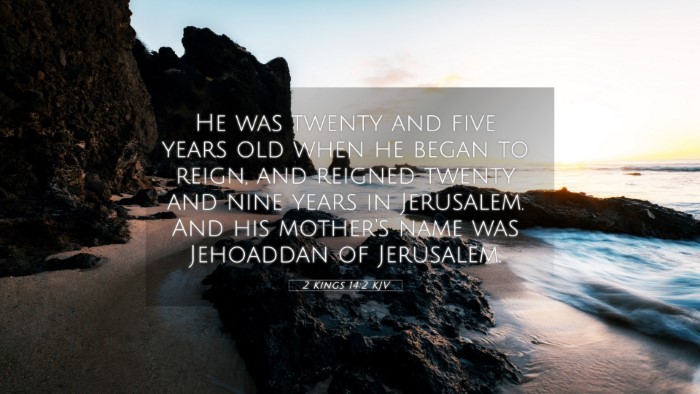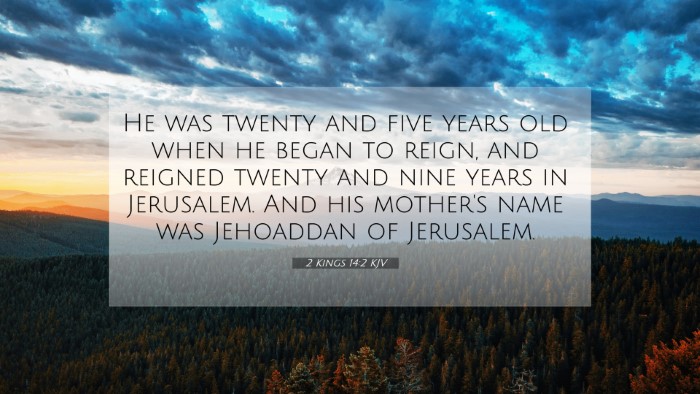Understanding 2 Kings 14:2
This verse details the ascent of Amaziah to the throne of Judah, encapsulating significant context regarding his lineage, character, and the religious state of the kingdom at that time. Analyzing this verse through various public domain commentaries provides a richer understanding of its meaning and implications.
Verse Context
2 Kings 14:2 states, "He did what was right in the eyes of the LORD, but not like his father David; he did everything his father Joash had done." This piece of scripture indicates the actions of Amaziah and compares them to previous kings, revealing the nuances of his faithfulness to God.
Commentary Insights
According to Matthew Henry, Amaziah’s reign reflects a mixture of faithfulness and failure. While he initiated reforms and sought to restore proper worship, his obedience was partial and ultimately led to instability.
Albert Barnes suggests that Amaziah's actions were not entirely commendable when viewed against the standard set by King David. David's heart for God represented a deeper commitment that Amaziah fell short of, indicating a need for repentance and full devotion.
Adam Clarke emphasizes that the reference to Joash highlights that while Amaziah followed in the footsteps of his predecessor, it is crucial to understand that true righteousness involves more than mere imitation of previous leaders; it is found in obedience to God's commandments.
Bible Cross-References
- 2 Chronicles 25:2 — Highlights similar notions of Amaziah's reign and further details on his faithfulness.
- 1 Kings 15:3 — Discusses the comparison of reigns and highlights the essence of true devotion to God.
- Psalm 78:72 — Notes the shepherding quality in leadership consistent with God's heart.
- 2 Chronicles 34:2 — Relates to subsequent kings, illustrating the gradual shifts in fidelity to God.
- 1 Samuel 16:7 — Reminds that God looks at the heart, a principle applicable to Amaziah’s evaluation.
- 2 Kings 12:2 — Reflects on the character of Joash and the implications for Amaziah.
- Isaiah 1:19 — Establishes the criteria for effective leadership in accordance with divine expectations.
- Deuteronomy 17:18-19 — Presents guidelines for kingship, reinforcing the importance of adherence to God's word.
- Micah 6:8 — Defines what God requires from His people, tying into Amaziah’s partial obedience.
- Proverbs 21:2 — Illustrates that every way of a man is right in his own eyes, highlighting the need for divine wisdom in judgment.
The Patented Path of Righteousness
This verse prompts a deeper engagement with themes of righteousness and the consequence of leadership. Through a comparative Bible verse analysis, we can observe the ramifications of Amaziah’s actions and decisions as both a mirror and a lesson for contemporary believers.
For those studying thematic Bible verse connections, the insights derived from 2 Kings 14:2 are invaluable, showcasing how the context of faithfulness reverberates across the scriptural narrative.
Conclusion
In conclusion, 2 Kings 14:2 serves as a poignant reminder of the importance of not only following God but doing so wholeheartedly. The verse, along with its cross-references, encourages both individual and collective reflections on the nature of obedience and the legacy of faithfulness. This inter-biblical dialogue strengthens our understanding of scriptural teachings and promotes comprehensive Bible cross-reference study methods.


